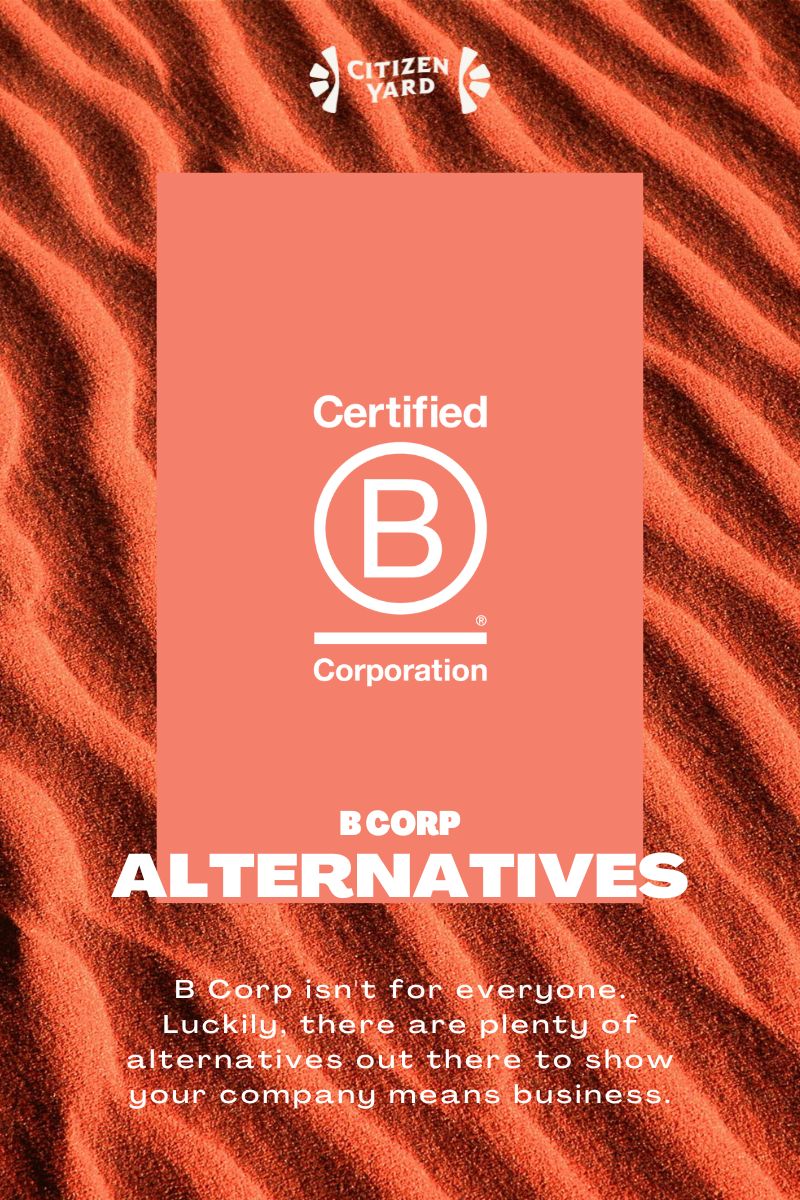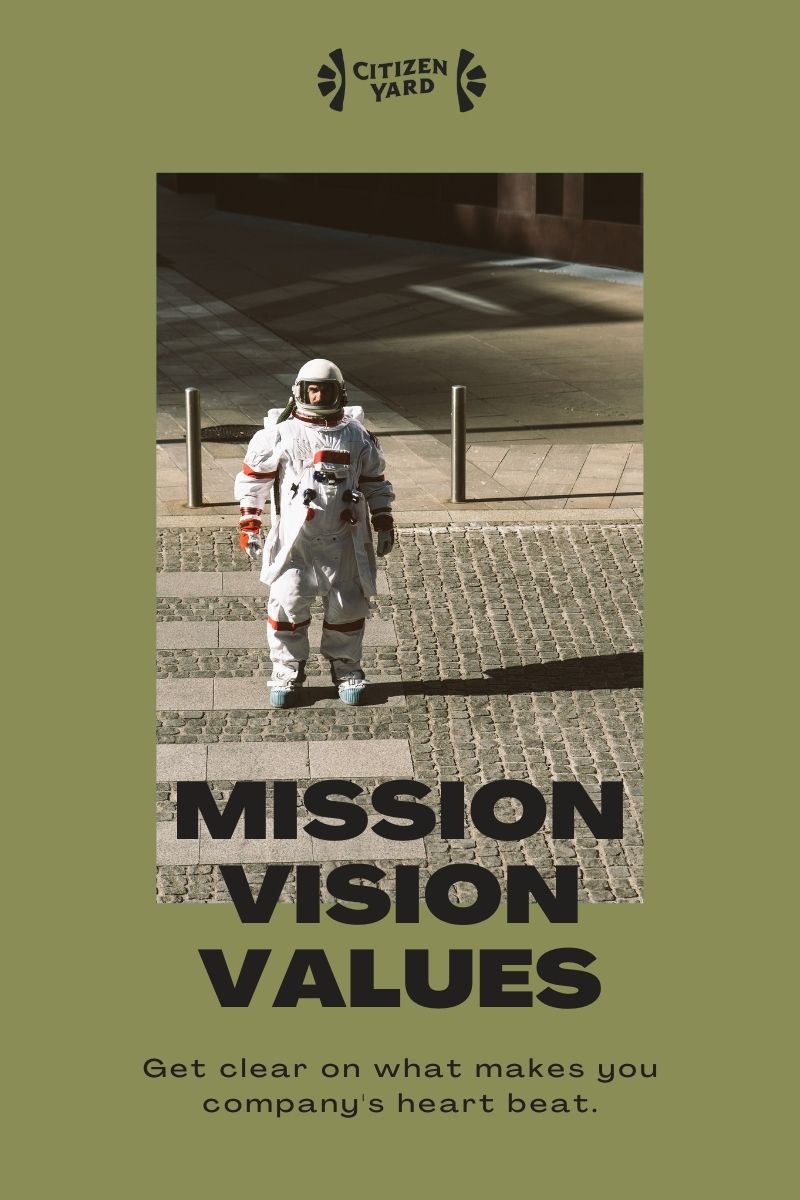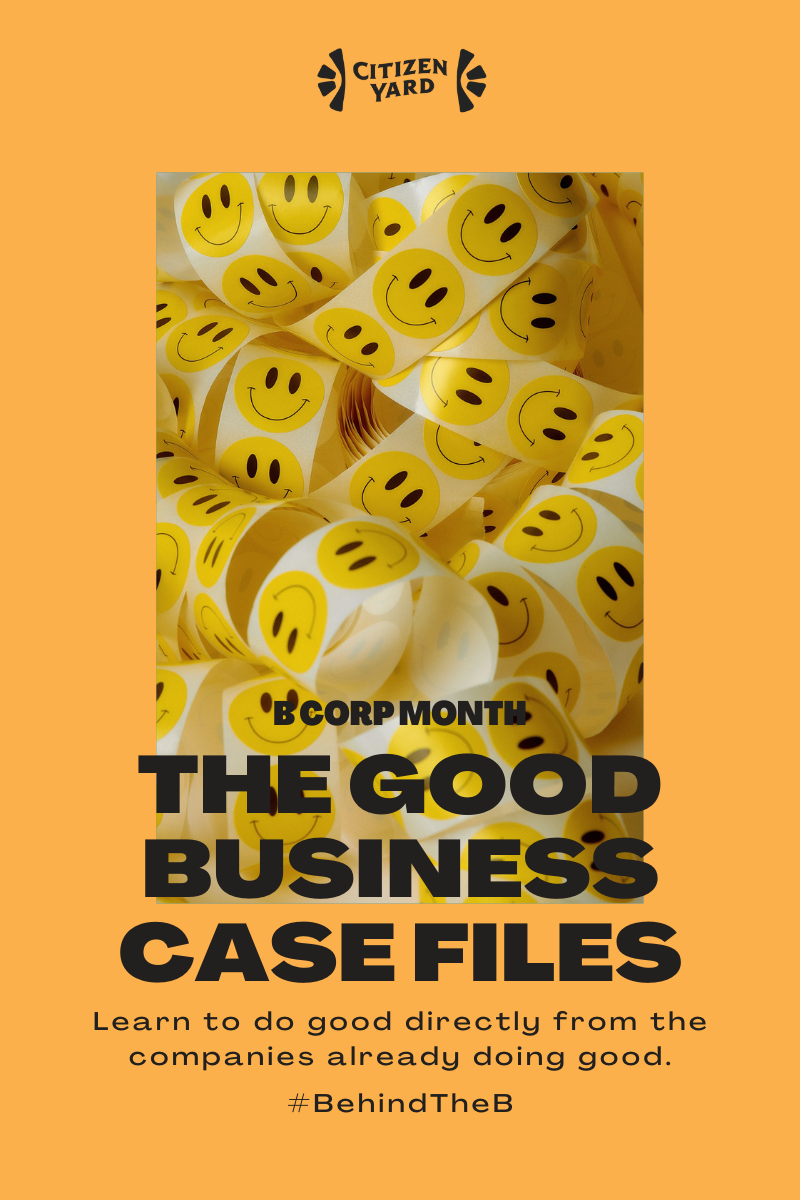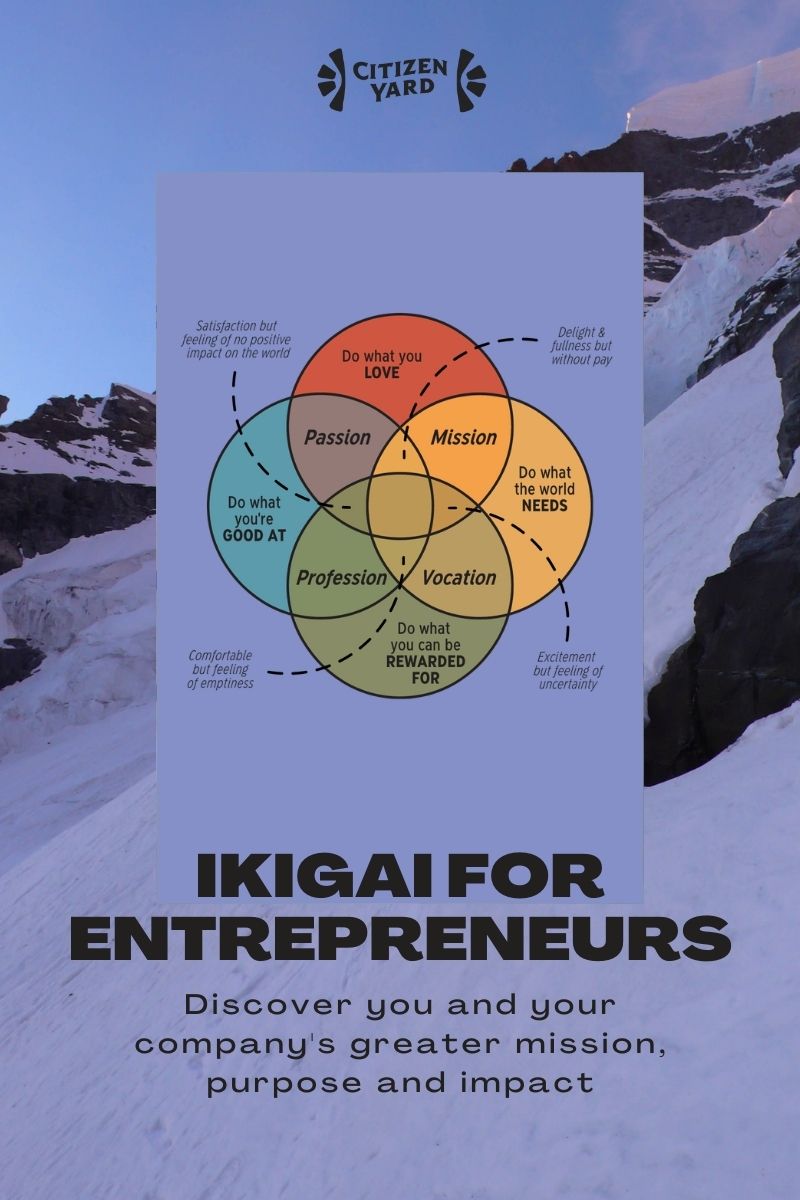
Discover Your Company’s Mission Using Ikigai
Table of Contents
Discovering you and your company’s big purpose can feel confusing on a good day and like an existential crisis on the worst.
What is my purpose? How can I use my company to make an impact in this world?

Today we’re walking you through the first step in our quest for purpose strategy and how it relates to finding your bigger mission, vision and values.
We use the Ikigai diagram for entrepreneurs.
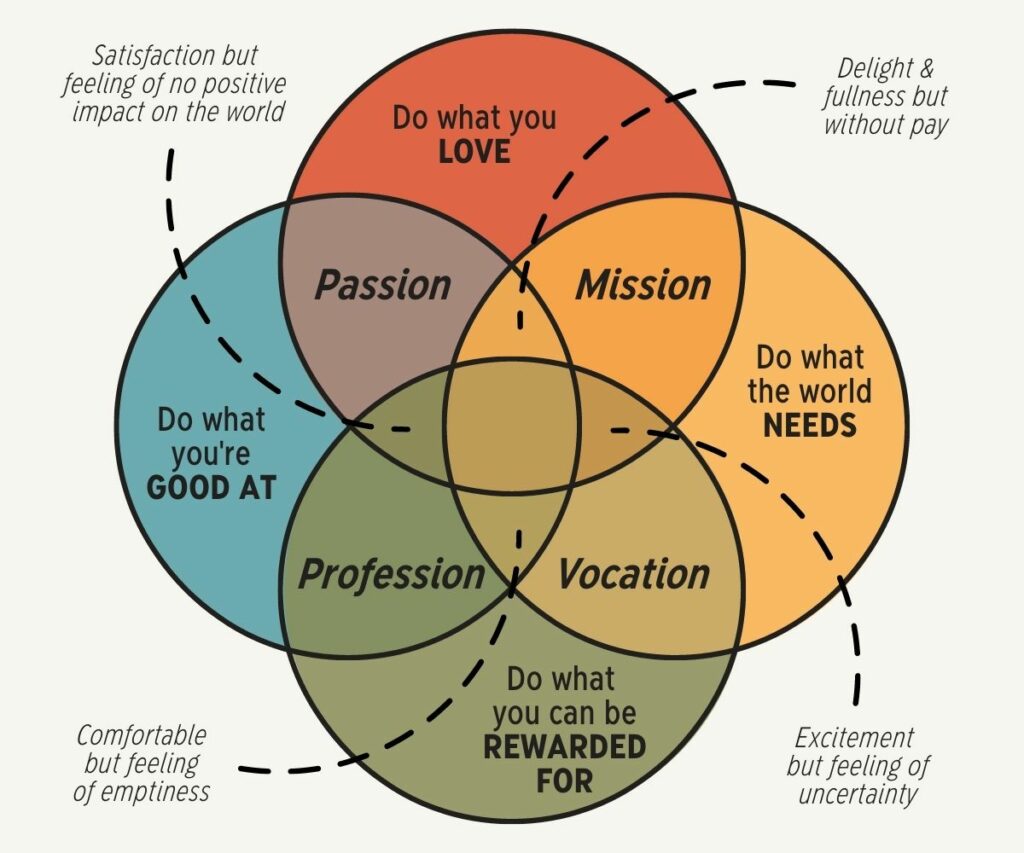
The entrepreneur’s diagram is a western take on a Japanese philosophy called Ikigai which roughly translates to “happiness in living” or “a reason for being” (we’ve seen it both ways). ‘Iki’, meaning life and ‘gai’, which describes value or worth.
We use the following digram as a framework to uncover our company’s inner purpose.
This is an application exercise. Pull out a pen and paper, maybe some colored markers if you’re feeling extra, press play on that inspirational playlist and let’s do this thing.
***
The Four Virtues
There are four virtues to the Ikigai: what you love doing, what you’re good at, what the world needs and what you can be rewarded for.
In this exercise, you’re going to answer each of these four virtues; first for yourself and then for your company. At the end, you’ll be able to find the common themes and gain a clearer picture of your purpose through work.

Zeal
The first virtue of Ikigai is to do what you love, which we’ll call Zeal.
"People with passion can change the world.”
— Steve Jobs
That’s the dream, isn’t it? To just do the thing we love all the time.
In western culture, especially if you’re a Millennial, you’re told life is about finding your passion and pursuing it come hell or high water. You think, “If only I could pursue my true passion then I would be truly happy and all will be well in the world.”
If only that were true.
As we work further through Ikigai, we’ll transition from inner focus to outer focus. You’ll see why having balance between the two is essential.
But to get started on this journey, we first look inward and start with the heart.
When solving the puzzle of purpose you must first find what gladdens you and makes you feel content and fulfilled. Once that inner need is met it’s easier to give to others with sustained, long-term effort.
When answering these questions, go with your gut. The answers don’t have to be complex or need to fulfill a grand life scheme. If feeling the sun on your skin is one of your life’s greatest joys, write that down. Turn inward and let that pen flow.
Find your personal Zeal:
- What brings me joy in life?
- When do I most feel myself?
- What do I love doing in my free time?
- What are my hobbies?
- What are my personal values and how do I apply them daily?
- Who are the people I enjoy spending time with?
- Where do I find beauty?
- What makes me feel calm?
- What bodily sensations do I feel when I am happy?
- What is something I’ve always wanted to learn or learn more about?
Find your company’s Zeal:
- What makes my team happy?
- Where does my team seem to be most naturally in sync?
- When do I see them smile, laugh and seem most joyful as a whole?
- During which projects, tasks, meetings and casual moments are my workers most engaged?
- In what situations do they just flow?
The most important question to ask is this: what doesn’t feel like work at all?
Paul Graham of Y Combinator put it best: “The test of whether people love what they do is whether they’d do it even if they weren’t paid for it — even if they had to work at another job to make a living. How many corporate lawyers would do their current work if they had to do it for free, in their spare time, and take day jobs as waiters to support themselves?”
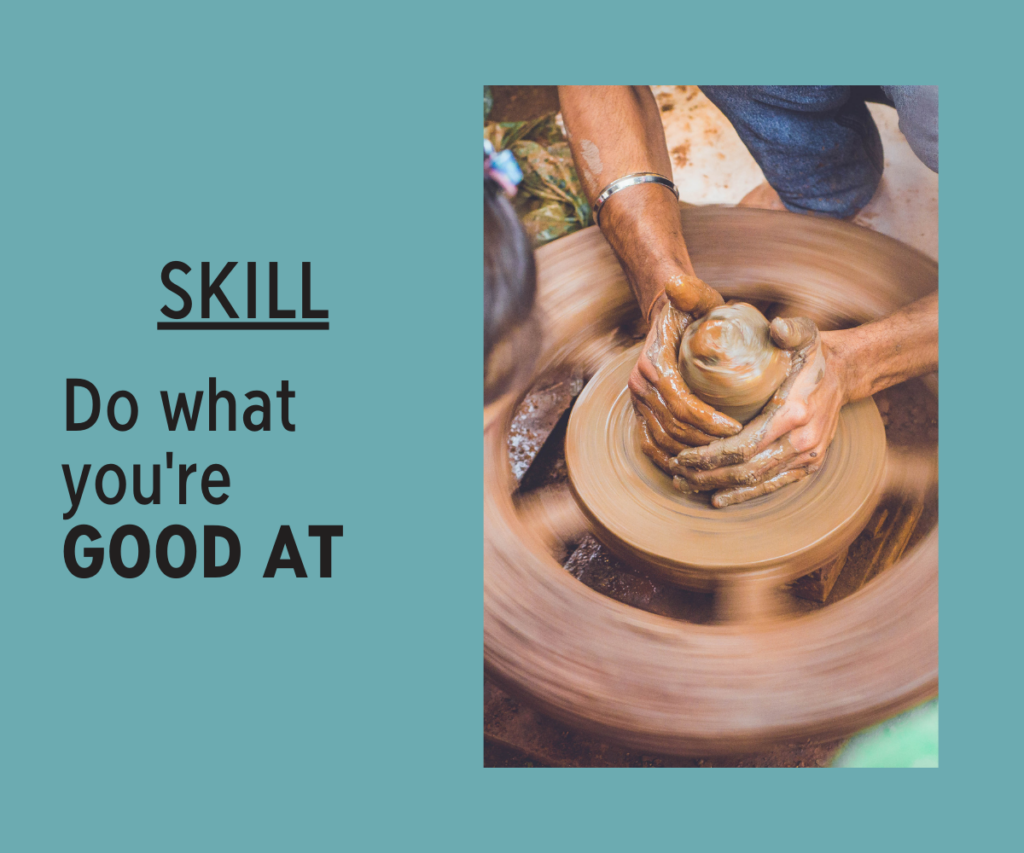
Skill
Continuing to look within, we’re now going to find what you’re good at — your Skills.
The skills we’re given in life are a gift. Don’t sell yourself short, we all have skills.
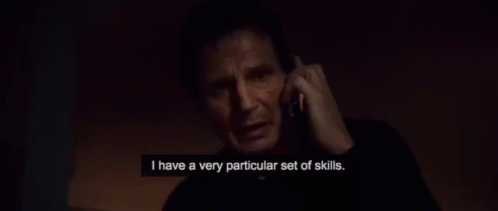
Sometimes our skills align with the things we enjoy doing. Othertimes, we find ourselves good at things we less than enjoy doing. In these instances it can pay to shift our attitudes.
In middle school I discovered endurance running came naturally to me. The cross country coach found out and I somehow got roped into joining the team. Only thing was, I hated running for miles on end in the hot, humid South Florida sun.
Every 3 mile run felt like an eternity that first season. But as I kept getting better and coming out on top in races, the sense of accomplishment carried me. Maybe it was the runner’s high but I went on to run every cross country and track season through my senior year. Now I run marathons and am itching to get into ultras.
Does that mean I love every run I do? Far from it. Some days I still have to force myself out the door, but it fills me with pride, keeps my body strong and 20 years later it’s something I can truly say I love.
The things we’re good at aren’t always obvious at first or even something we love. To uncover new skills you need a curious mind and a willingness to try new things.
For this next set of questions, think of both your hard skills and your soft skills. Skills in career, athletics, personal, academic, mental, emotional, artistic, hobbies — the list goes on. And a skill doesn’t need to be mastered to make it on the list. Think through skills that you may have just discovered or are still developing.
Find your personal Skill:
- Take inventory of the things you already know you’re good at.
- What activities do you do in your personal time?
- What seems to just come naturally?
- What does success mean to you?
- When was a time you felt successful?
Find your company’s Skill:
- What types of projects does your team naturally excel at?
- What projects does your team take on because you know they’ll be easy to just get done?
- What projects and tasks do you hand off to your team with full confidence knowing they’ll get done and need little oversight from you?
Remember, to find what you’re good at you have to be willing to try new things as well as hard things. You’ll never know until you try.
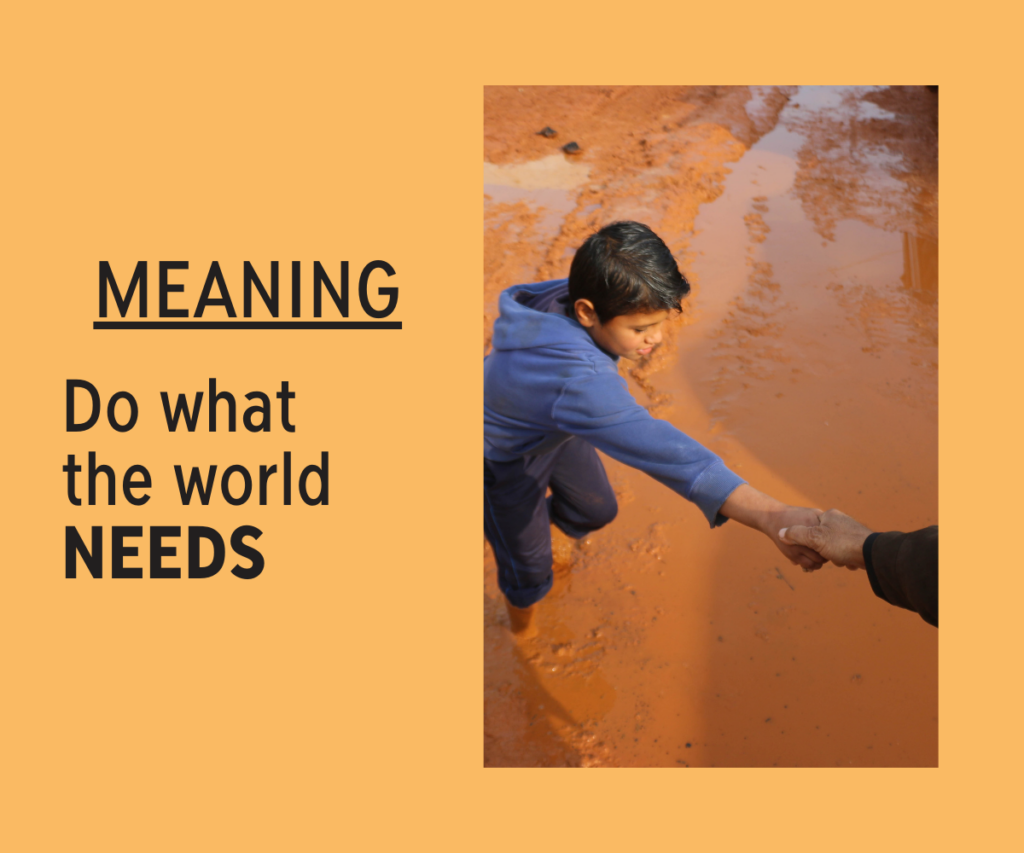
Meaning
The third virtue is to do what the world needs. This is your Meaning.
Doing what you love and what you’re good at is vital to maintaining an internal equilibrium of contentment, but in the end it can all feel meaningless if the focus stays on yourself. If you really want to unleash the full power of the human spirit, we must look outward.
"The sole meaning of life is to serve humanity.”
— Leo Tolstoy
Using our zeal and skills to better the world will shift internal contentment to one of elation. Scientific evidence shows that givers are not only healthier and live longer, but they experience greater levels of happiness as well.
Don’t kid yourself into thinking pursuing purpose is a walk in the park. Hard times will come and when they do, personal passion for a project will wane. And since you’ll be facing an obstacle you most likely haven’t experienced before, any skill you have will receive a shock as well.
This is when outside motivation will help get you through. Doing something for reasons other than yourself will become the purpose you need to overcome.
Find your personal Meaning:
- Is there an obvious issue to you where you think you can help?
- What’s missing in the world?
- What do you want to be remembered for when you’re gone?
- How can you be more involved in your community?
Find your company’s Meaning:
- What’s missing in your industry?
- Is there an obvious injustice unique to your industry, community, customers, supply chain?
- Is your company already seen as unique or a leader in a particular area?
- Ask your workers what they’ve noticed is lacking in the industry.
- Is there a way your product or service can be used to serve others or make their lives easier or improve their lives?
Meaning can be a tangible product or service, but it moves beyond the tangible as well. Your meaning can lie an ability to uplift people through inspiration. Perhaps you equip them with a necessary resource or connect them to others or information.
Your talents don’t need to be the gift. The effects of your talent can be what drives meaning.
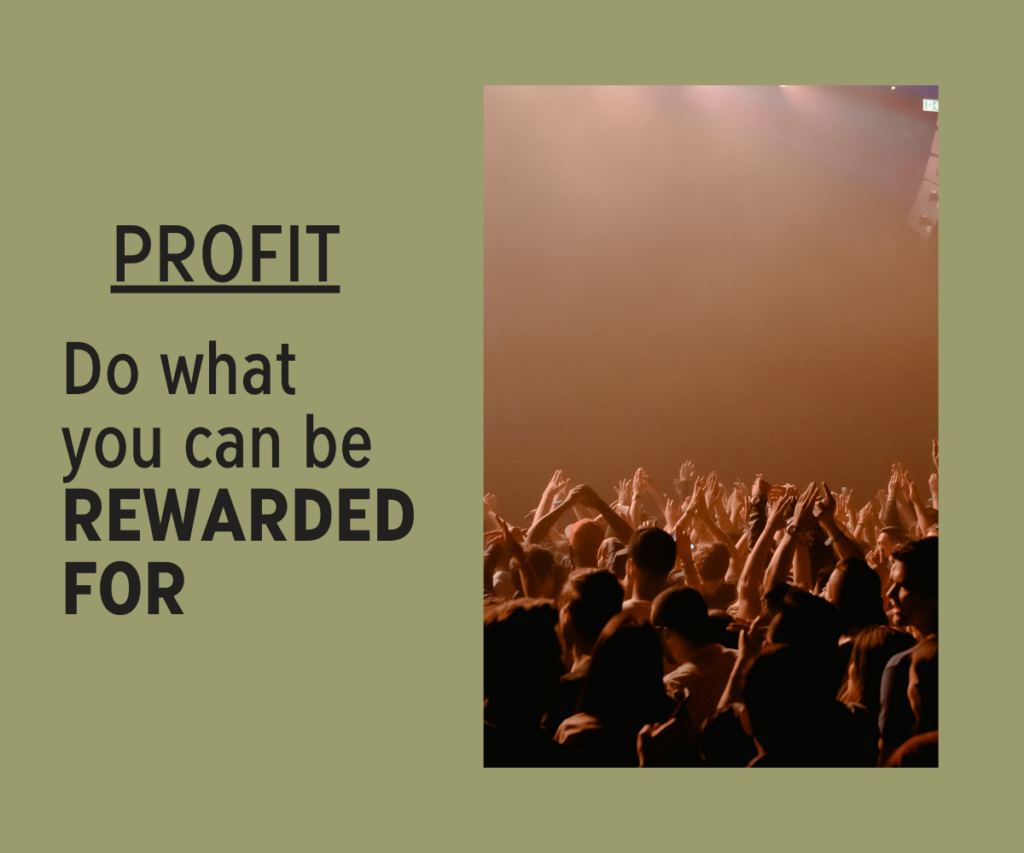
Profit
The fourth virtue is what you can be rewarded for, or Profit.
Being rewarded for your purpose doesn’t make you selfish, corrupt or a sellout. Being rewarded for your purpose equips you with the resources to serve the world for the long haul.
Monetary gain is only one form of profit. Profit can also come in the form of referrals, publicity, accolades, prestige, built-in marketing, trade, power and more.
Many businesses have failed not for lack of passion or trying, but simply because the world didn’t need what they had to offer resulting in no reward to keep them going. But if you can unlock the right configuration of using your zeal and skills in a way the world actually needs, then it’s much more likely that profit will follow.
It does take a deal of experimentation though, so let’s analyze profit to squelch some risk.
Find your personal Zeal:
- Identify your basic monthly needs. Ensure these are being met first.
- What do you currently do to acquire profit?
- What have you done in the past to acquire profit?
- What would you do with more money, prestige, power, publicity, etc.?
- What’s your ideal work environment and schedule?
- What is important to you when it comes to work?
- Does your current role use your skills in a way that leaves you fulfilled?
Find your company’s Zeal:
- Identify basic company/team monetary needs. Ensure these are covered first.
- How does your company ensure these needs are met?
- Does your team feel secure and fulfilled in their roles?
- Are there areas of neglect/frustration in your customer experience?
- Do clients/customers feel supported?
- Are there services or products your clients/customers regularly ask for?
- Have you done any market research into other ways your company can generate more of your desired reward? Insert that here.
- What would your company do with more reward?
I’m going to mention it one more time because it deserves repeating:
Being rewarded for your purpose doesn’t make you selfish, corrupt or a sellout. Being rewarded for your purpose equips you with the resources to serve the world for the long haul.
***
Find Purpose In The Margins
Now that we’ve identified and worked through the four virtues, our next step is to read between the lines.
In this part of the exercise you’ll look at the spaces where virtues overlap and identifying patterns in alignment. The goal at this stage of the exercise is to balance the inward virtues of zeal and skill with the outward virtues of profit and meaning.
When we focus too much on our own interests, we miss out on opportunities where we can deliver purpose. And if we focus too much on the world’s needs or solely pursuing profit we either get bored, burned out, lose sight of the why or blinded by greed.
Psychologist Adam Grant talks about this phenomenon in his book Give and Take, “Selfless giving, in the absence of self-preservation instincts, easily becomes overwhelming.” The ideal to balance is “being willing to give more than you receive, but still keeping your own interests in sight.”
For this next part, you’ll find the margins of alignment. These margins are where our skills, zeal, meaning and profit naturally align.
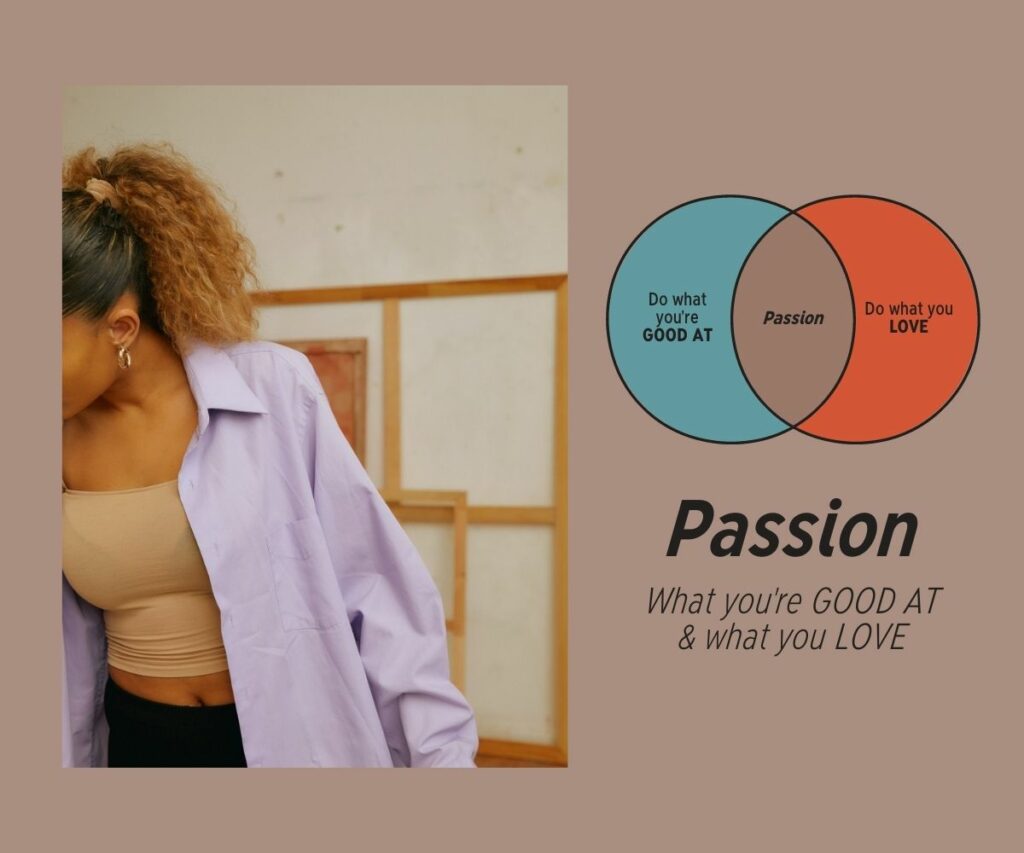
Zeal + Good = Passion
When you align what you love doing with what you’re good at, you find your Passion.
Passion are the things you enjoy, are skilled at and would most likely do for free.
Is your team in a bit of a rut? Add a bit of spice in the form of a passion project. Passion projects can take form either as a volunteer opportunity or in the form of pro bono services. In the passion realm is where you and your company can look to gather inspiration.
Get out of the office for a team volunteer day or embark on a creative project that’s measured by impact and collaboration, not by monetary profit.
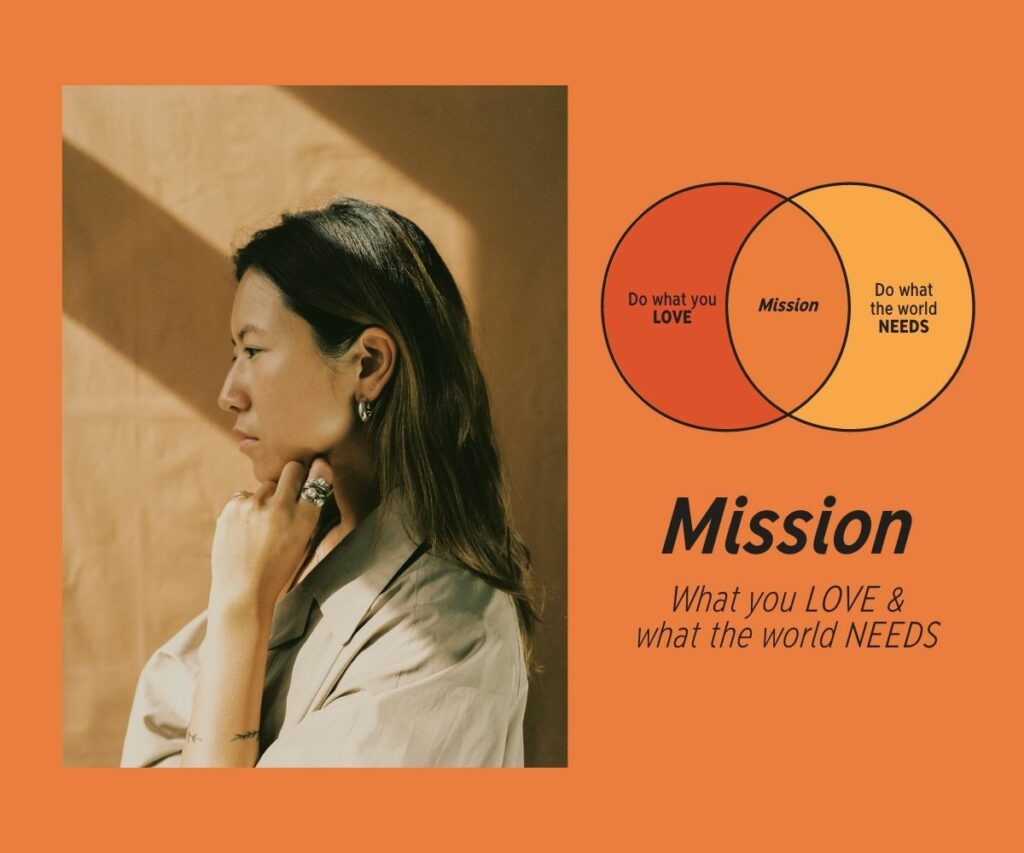
Meaning + Zeal = Mission
Zeal and need align to create your Mission.
Is there something the world needs that aligns with your zeal?
Items within your mission are those things you find yourself advocating for. Your mission most likely aligns with your personal values or the values of the company.
Much like passion, mission is an alignment margin where you will uncover volunteer inspiration and opportunities to bring on pro bono work or passion projects. The difference though is that even though this is your mission, you may not be considered a professional in the arena just yet.
And that’s okay! Keep going with the purpose exercise and we’ll get you there.
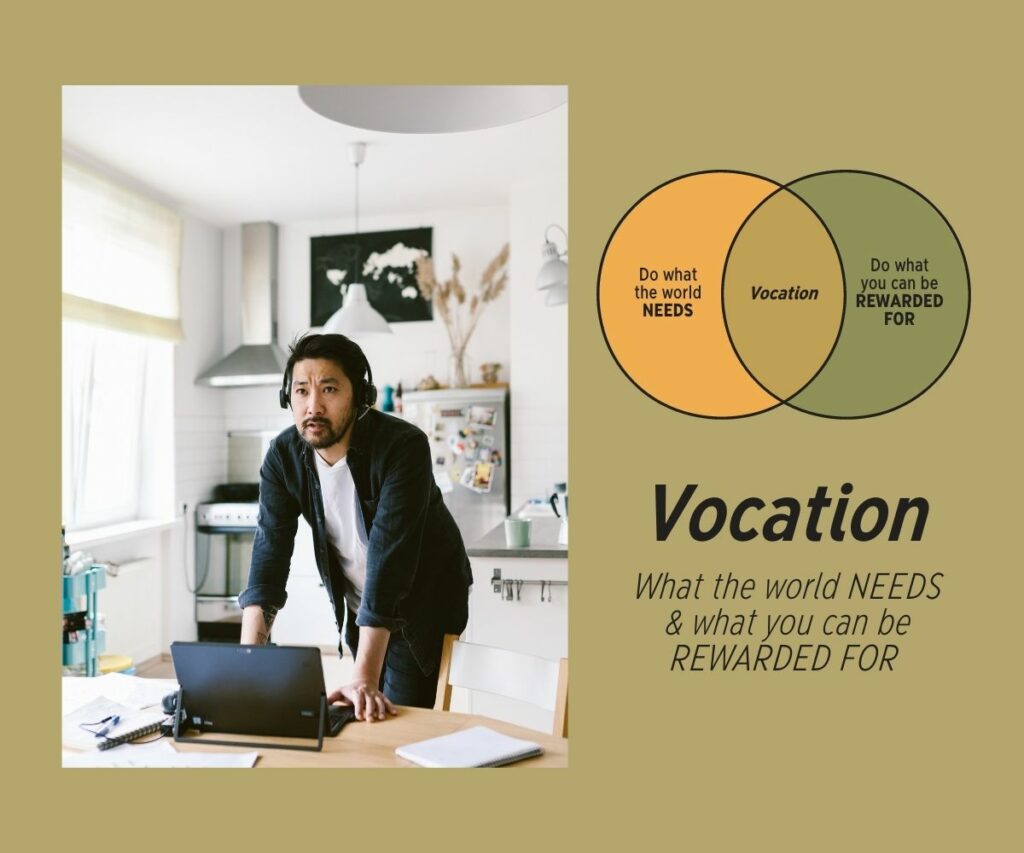
Reward + Meaning = Vocation
If you’ve been able to identify a need and can be rewarded for it, then you’ve uncovered your Vocation.
Cruising in the vocation zone can be a tricky place to be, especially when the reward is a good one (such as with a sweet sweet paycheck). We’ll keep burning and churning in this exclusively outward-focused zone at the expense of our internal contentment.
In this zone you need to be asking yourself two things:
- What can I do to bring more passion into the mix?
- How can I challenge myself, avoid complacency and bring a better result?
In the realm of vocation, is there something that jumps out as either something you could apply more Mission or Passion to? Focus your attention there.
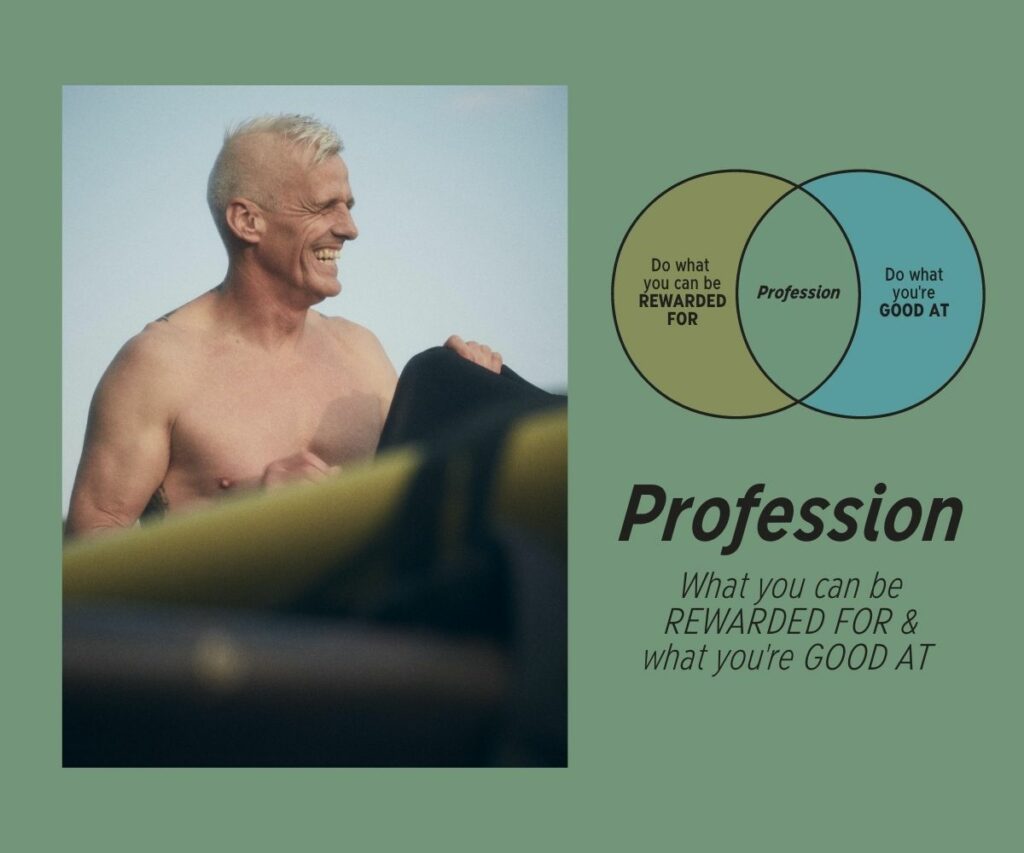
Good + Reward = Profession
Our skills and what we can be rewarded for align to form our Profession.
The difference between profession and vocation? A vocation is something we do. A profession is something we do well.
Professions often require prolonged training or a more formal qualification to accomplish. And a profession is obviously something you do with great skill because you’re being rewarded for it. It’s your area of expertise.
Are there areas in your life that you’re good at and can be rewarded for? Maybe you’re already being rewarded for them but know you can either upskill for a greater outcome. Or if you’re trying something new and discover you’re talented, can you develop the skill further to capitalize on your talents? Perhaps renegotiation of the reward is required. Highlight these areas.
With a little passion and mission, it’s not uncommon to shift a vocation into a profession.
***
Solving for Obstacles
In an ideal world, we would all be in a vocational role in our chosen profession, doing what we love to make the world a better place.
It’s inspiring when we see others doing exactly that. They pursue their purpose with such effortless dedication and effect. But the people in those esteemed roles didn’t get there by accident, they worked their way into establishing those positions.
We’ll have you there too, but first let’s recap what we’ve done so far.
In the first part of this exercise you identified your zeal, skills, profit and meaning. In the second part you analyzed where these four virtues align in your life and company to discover your passion, mission, vocation and profession. In this last part of the exercise, you’ll look in the grey wanting regions to overcome obstacles and uncover areas of opportunity.
These areas of opportunity are where you’ll encounter your biggest hurdles in your push for purpose. But we’ll also show you how to overcome them and transform obstacles into your greatest asset to solve for the elusive missing piece.
Now pull it all together to find areas of opportunity.
In Ikigai, you’ll notice four vacuums where things are lacking. These are your areas of opportunity. In the third exercise we’ll uncover ways to improve each.
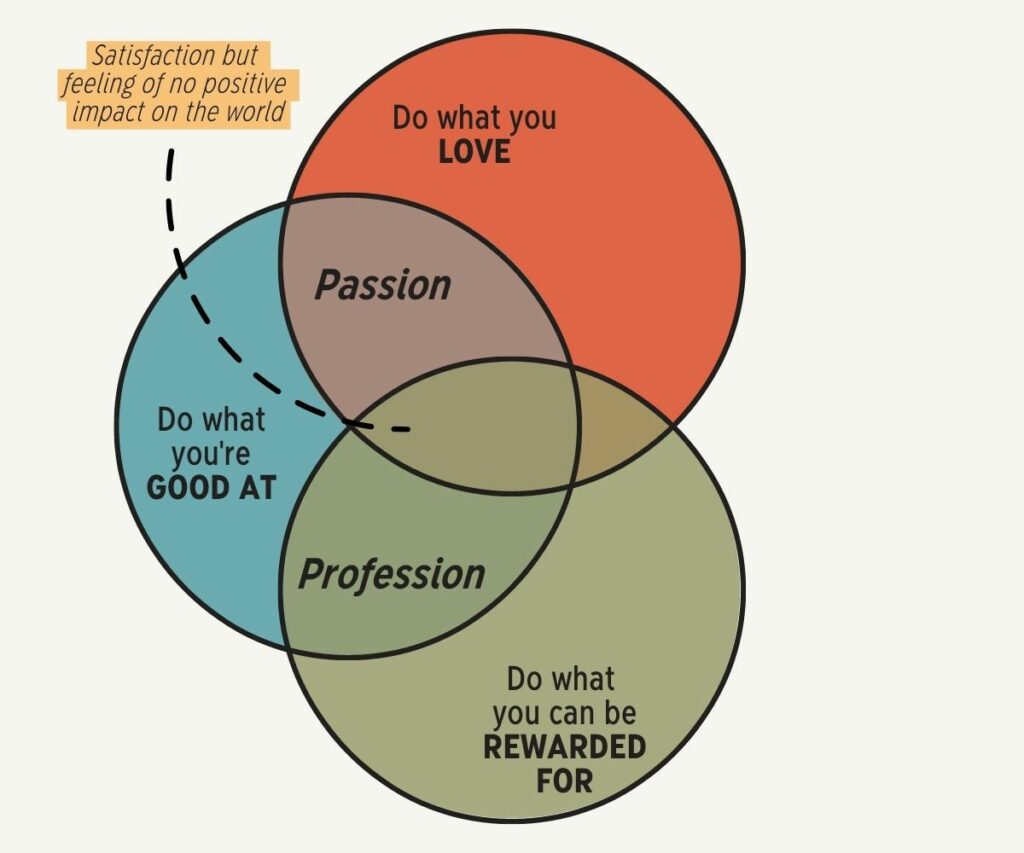
Profit + Skill + Zeal - Meaning = Satisfaction but lacks feelings of positive impact
It can feel pretty superhuman to be good at something, even more so if you enjoy it and get paid the big bucks for it. The problem is finding a way to use what you’re good at in a way that has an impact on the world.
This is the classic pro scenario.
There are many talented people out there getting paid to pursue their profession. But as we’ve seen with many professionals, money and prestige don’t always translate to happiness. It lacks the all-important ingredient of finding a need in the world where their profession can be put to use.
Let’s look at professional photojournalists, Jimmy Chin and Lynsey Addario.
Jimmy Chin and Lynsey Addario are two very well-esteemed and decorated photojournalists who have taken their love and skill for photography and turned it into a profitable career. They could have easily ridden their talents in photography and that have been it. Instead, they honed in on a need in this world to capture stories from the places most many wouldn’t dare to wander.
If you’re unfamiliar with Jimmy Chin, Chin is a lead on the creative team behind the movie Free Solo and won an Oscar for his work. He travels to the most remote and unpredictable regions of the world experimenting with innovative techniques to capture some of the world’s most extreme stories.
Lynsey Addario on the other hand is a decorated wartime photojournalist who puts her life on the line every time she goes to work. But she does it to keep the rest of the world informed (and in check) of humanity’s darkest side. The truths she captures are heart wrenching but images the world needs to see.
Takeaway: Elevate your profession by unlocking a need in the world that your passion can fulfill.
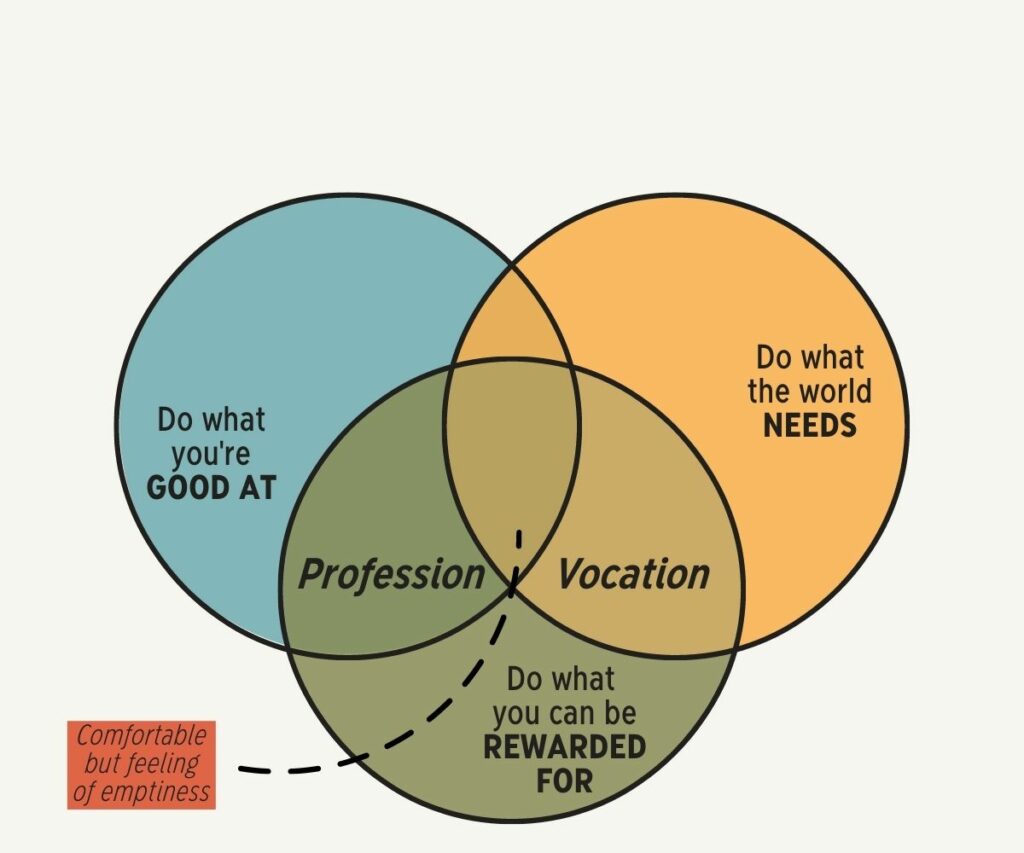
Meaning + Profit + Skill - Zeal = Comfortable but feelings of emptiness
Comfort is the killer of keeping good things from becoming great.
It’s cozy in our comfort caves and sometimes rejuvenating to hang there. But to reach higher heights we have to do hard things. Passion is the secret ingredient that can drive us to reaching those higher heights.
We’ve seen this playout historically. No one thought it was possible to break the four minute mile or climb the world’s tallest peaks until it was done. Now a sub-4 minute mile is an Olympic standard and Everest’s summit is regularly a traffic jam.
Overcome the obstacle of complacency by leaving the comfort zone to try new and hard things.
Experiment. Trying something new can be as big as offering a new product or adding a new position to the team. Or it can be as simple as tweaking a current offering until you have it just right.
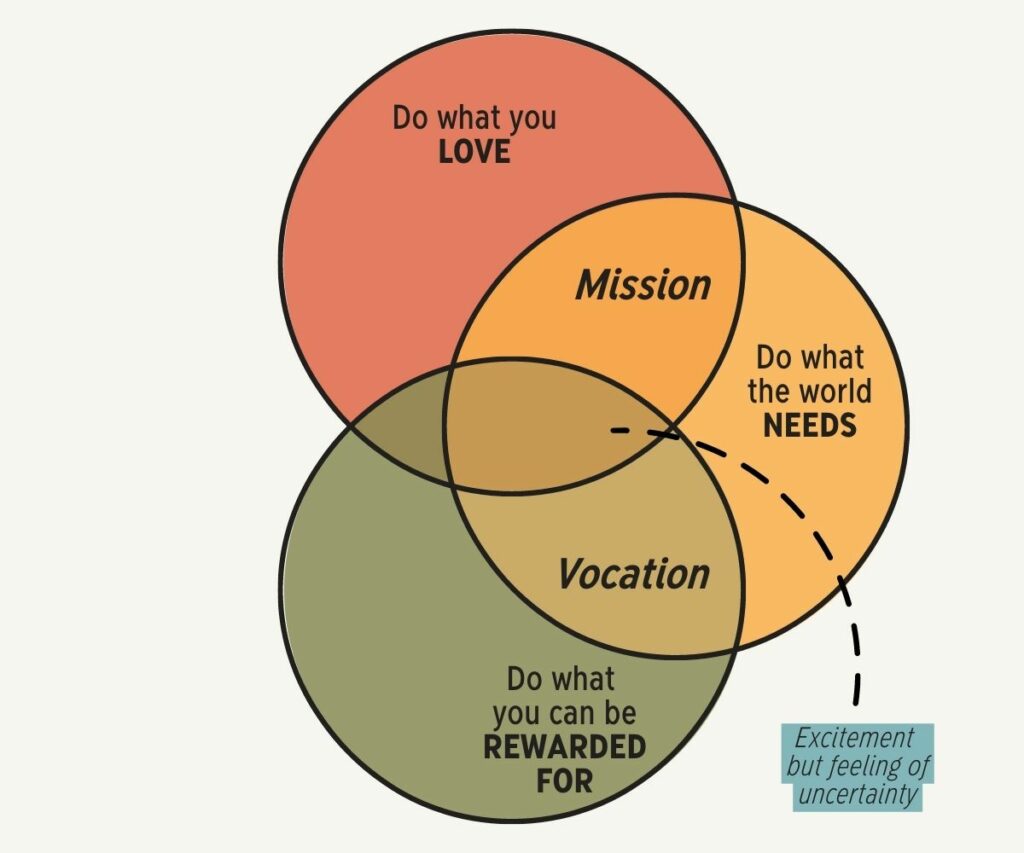
Zeal + Meaning + Profit - Skill = Excitement but feelings of uncertainty
As we said, the difference between passion and mission is expertise.
You’ve chosen to pursue the mission, but do you have the skill, time, equity and energy to fulfill it? When vocation and mission lack the talent to get to the next step, it’s time to level up.
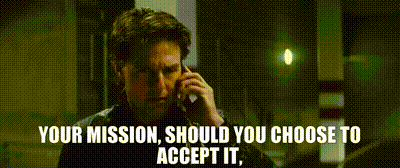
Let’s look at an environmental organization headed by an unlikely leader: Milky Change formed by the indie rock band duo, Milky Chance.
Milky Chance’s path into environmentalism started with the simple idea of making their tour merch more sustainable. Once they calculated the true scale of harm caused by their touring footprint, the band went down a rabbit hole and got to work.
One problem: they’re musicians. While they had the heart, they lacked the skills.
In their own words,” We know that making our business eco-friendlier is going to be a long process with lots of obstacles to overcome and loads of tasks to attend to, so we got ourselves a little help…”
Milky Chance hired a sustainability manager in 2019 in help the band find more ways to be more eco-conscious, make better choices and scale their advocacy. They took a student’s mindset and jumped in headfirst, unafraid to fail.
It just goes to show, there’s nothing wrong with asking for a little help.
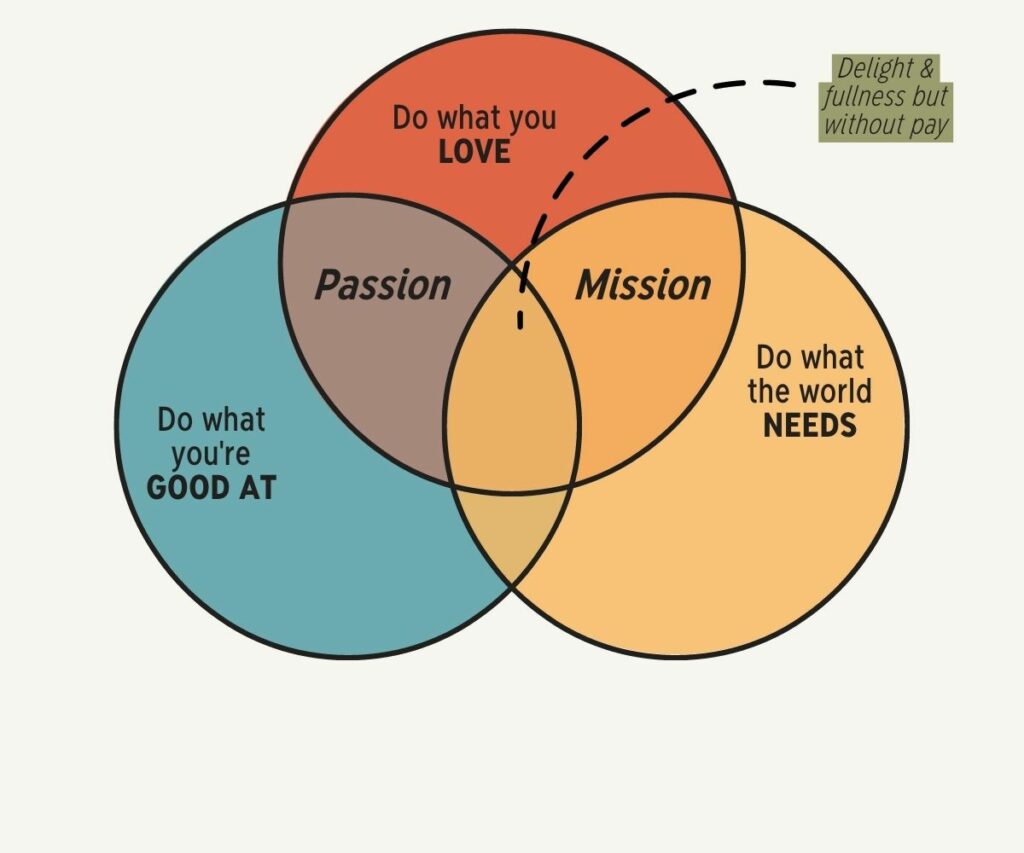
Skill + Zeal + Meaning - Profit = Delight & fullness but without pay
This final pitfall is a very familiar one for entrepreneurs.
You have the passion. You have the expertise. The need is there. Now if only you could figure out how to get paid.
When profits are missing, connecting with your core audience is the missing link.
Let’s look at Bureo co-founder Ben Kneppers.
Ben and his business partners formed Bureo to develop a sustainable business model alongside the Chilean fishing industry to deliver high-quality recycled products. The need for recycled products was there and as both a mechanical engineer and environmental consultant, Ben perfectly fitted the bill.
To garner funding to support the business, Ben had to tap into two very different communities. He had to connect with the the larger business community to find companies that could use the end product while simultaneously connecting with Chilean fishing communities use to working with western execs that offered the world only to disappear two weeks later.
On the business-side, they honed in on companies already toying with eco-innovations such as Costa, Carver skateboards, Trek and Patagonia. To connect with Chilean communities, they put boots on the ground, establishing long-term relationships with Chilean fishermen and their communities. Ben and his wife even moved full-time to the fishing village of Cocholgüe, Chile.
So I leave it to you. Where is your core audience hanging out these days? Are you connecting with them on a regular basis? If you answered “No” to either of these questions, then what are you still doing here talking to me!? Get out there and start connecting!
***
Wrap Up
We covered a lot today and your brain may be spinning. Here’s your recap…
STEP 1: Fill out the four virtues to identify what you love to do (zeal), what you’re good at (skills), what you can be rewarded for (profit) and what the world needs (meaning).
STEP 2: Identify where your virtues align to discover your passion, mission, vocation and profession.
STEP 3: Fill in the blanks in the areas of opportunity to solve for purpose.
Now that you’ve found your purpose, you can use this diagram to begin exploring options for the deeper mission, vision and values of you and your company.
Resources
These are some of the tools we used to bolster our own knowledge about Ikigai and pursuing purpose.
Share :
Key Takeaway
Find balance between the inward virtues of Zeal & Skill and the outward virtues of Meaning & Profit. Be willing to give more than you receive, but still keep your own business interests in sight.
Next Up
Join our weekly Backyard Tailgate, a newsletter to help brands live out their mission & lead with purpose.
Each Tuesday we visit your inbox to share what we’ve learned on our own impact journey, resources, tips & tricks and introduce you to some of our world changing friends. We keep it real. We keep it honest. But most importantly, we keep it actionable.
